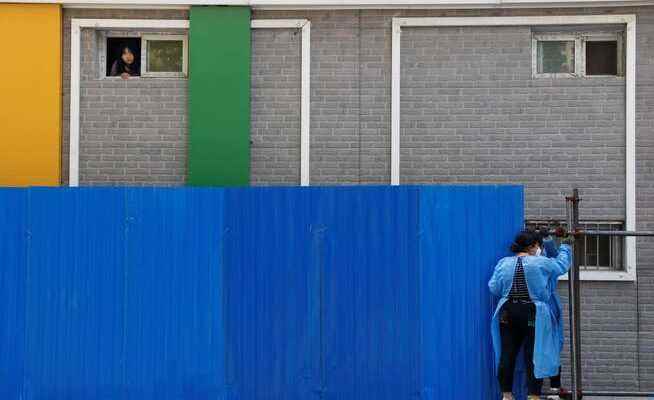Only a tiny proportion of people infected with the omicron variant become seriously ill. This is shown by a recent study from Shanghai. But China’s government is ignoring the results and is adamantly sticking to its controversial course.
Workers wearing personal protective equipment (PPE), install a barricade around a residential area under lockdown while a resident looks out from a window, amid the coronavirus disease (COVID-19) outbreak in Beijing, China, May 4, 2022.
A few months before the Communist Party Congress, at which the head of state and party leader Xi Jinping wants to be confirmed for a third five-year term, a new study raises questions about his controversial zero-Covid policy. China’s Center for Disease Control and Prevention presented a study a few days ago, according to which out of around 33,000 hospital patients infected with the omicron variant in Shanghai, only 22 became seriously ill. After the number of daily new infections in the city of 26 million people rose sharply in March, the authorities imposed a two-month lockdown in early April.
China is pursuing a strict zero-tolerance policy as part of the fight against the pandemic. Anyone who tests positive for the corona virus is admitted to the hospital or to a public quarantine center. If the authorities determine only one positive case in a residential area, the entire residential complex with sometimes thousands of residents is cordoned off. When the city administration in Jilin City in north-east China found a new infection this week, it ordered the 3.6 million inhabitants to take a three-day so-called “rest phase”. According to the city administration, the residential complexes should only be left in exceptional cases.
Zero Covid policy wastes hospital capacity
All of the 22 seriously ill patients in Shanghai were older than 60 and had previous illnesses. The study results are consistent with other studies, according to which the omicron variant leads to less severe disease progression than the delta variant of the coronavirus. The Shanghai data also suggests that China’s handling of infected people is leading to a huge waste of hospital capacity. Experts point out that the majority of those who tested positive could isolate themselves in their own homes. This leaves hospital beds free for patients who actually need them.
Well-known Chinese virologist Zhang Wenhong was also involved in the Shanghai study, which was conducted between March 22 and May 3. He pointed out that the results provided evidence that spoke in favor of adapting the zero-Covid strategy. In the past, Zhang had repeatedly criticized overly strict lockdowns.
As part of the latest wave of infections in Shanghai, the local authorities registered one death among around a thousand infected people. The vaccination rate in the economic metropolis is below the Chinese average. Western virologists point out that the ratio of deaths to infected people could easily be improved to one in ten thousand by increasing the rate of vaccination. But that’s exactly where the problem lies. China currently vaccinates an average of 1.5 million people every day, up from an average of 30 million a year a year ago. If China were to vaccinate more quickly, the government’s argument that the Chinese health system would collapse in the event of an uncontrolled wave of infections would lose weight.
China’s government also ignores business voices
But rational arguments no longer play a role in the Chinese discussion about the zero-tolerance strategy. Rather, the discussion is politically charged because it is closely linked to the person of Xi Jinping. China’s state media celebrate Xi as the originator of the zero-Covid policy, which – unlike the West’s approach, which simply sits back – puts people’s lives first. If that were actually the case, the government would have started a broad-based vaccination campaign long ago.
During the lockdown in Shanghai, there were repeated small protests against the government’s ruthless course. Last week, residents of the city of Kunshan near Shanghai protested because officials prevented them from traveling to the metropolis. However, there are no signs of a broader protest movement against the Zero Covid course. Observers are wondering whether China might back away from its strict course after the party congress planned for November.
Grumbling about politics is getting louder among the country’s companies, and they are increasingly holding back on activities and investments due to uncertainty. Last weekend, former Treasury Secretary Lou Jiwei warned that the heart of the problem was how the relationship between pandemic control and economic growth was weighted. China’s state media ignored Lou’s comment.
